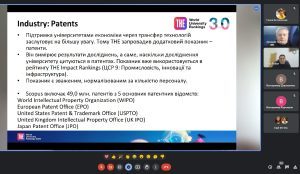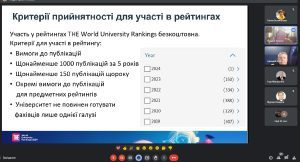Workshop on THE World University Rankings 2024 results
The following issues were considered at the regular meeting of the permanent seminar on sustainable development:
1. Analysis of NURE results in the THE World University Rankings 2024
2. Outlook for NURE participation in the Times Higher Education rankings.
In his opening remarks, Acting Rector Ihor RUBAN noted that the University maintains its position in world rankings under incredibly difficult conditions. We can consider this result more than satisfactory. However, against the background of the dangerous situation, the transition to distance learning, the relocation of part of the staff abroad, the loss of foreign students, and other heavy losses, the task of keeping up in the rankings is a very ambitious challenge for the entire team.
Vice-Rector Vasyl ROSSIKHIN presented proposals for improving scientometric indicators.
Larysa CHALA, Head of Benchmarking and Web-Management Department, presented an analysis of NURE results in THE World University Rankings 2024, taking into account the new methodology, the content of the new ranking indicators and their weight.
The publication activity trends and NURE scientists innovations were also considered. Weaknesses in terms of international collaboration were identified, namely the share of publications with foreign co-authors and the current state with the academic mobility. In general, the workshop participants concluded that the representation of NURE in the world’s leading university rankings, in particular the Times Higher Education Rankings, is important for raising the status and competitiveness of the university for the following reasons:
- international reputation – the participation of the University in the THE rankings improves its international reputation and this affects the choice of students, including foreign students;
- Increased attractiveness for students – universities included in the rankings usually increase their attractiveness for applicants, which leads to an increase in the number of high-quality, motivated applicants and increased competition among students;
- attractiveness for researchers and teachers – universities that are regularly included in the rankings attract researchers who can contribute to the improvement of research;
- international cooperation – participation in rankings is an incentive to develop international cooperation with other universities and research institutes;
- attracting funding – a successful rating increases the possibility of obtaining funding from the state, private foundations and organisations;
- striving for excellence – participation in world rankings can be an incentive for the University to improve the quality of education, research and infrastructure, etc.










